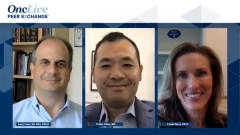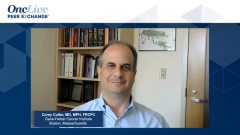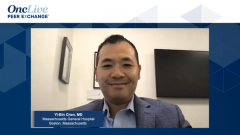
Steroid-Refractory GVHD: Enrolling Patients on Clinical Trials
Key opinion leaders highlight the value of clinical trials and share their perspective on enrolling patients in the setting of acute GVHD.
Episodes in this series

Transcript:
Corey Cutler, MD, MPH, FRCPC: That’s a pretty comprehensive answer. Obviously, you said a couple of key words in there, and what I liked is “clinical trials.” While we do have ruxolitinib as the first-line therapy for steroid-refractory disease, we know that response rates are not great even with ruxolitinib, and they’re not necessarily durable. I think your approach of ruxolitinib plus another agent or alternatives to ruxolitinib always needs to be considered.
Yi-Bin Chen, MD: I think we should point out that if you look at the REACH2 [trial] data, which was the validation of the approval of ruxolitinib, the durable CR [complete response] rate at day 56, so 8 weeks out, is 26% for steroid-refractory acute GVHD [graft-vs-host disease]. That [leaves] a lot of room for improvement beyond ruxolitinib. Ruxolitinib is definitely a step forward; it is an approval, there’s access for patients, [it] definitely helped a lot of our patients. But certainly for the steroid-refractory acute patients, I think we definitely need to do better.
Corey Cutler, MD, MPH, FRCPC: One thing that I’ve taken to heart is the fact that the GI [gastrointestinal] tract takes a little longer to improve. So I agree with your assessment that you can look at the skin, you can see if the skin is not getting better at all. I tend to wait a little longer than the standard 7-day course before starting a second-line therapy for the GI tract. It just takes longer than 7 days to re-epithelialize the gut and to allow for effective water translocation out of the gut into the bloodstream. Of course, if your hand is pressed and patients look sick, then you have to do what you have to do. We employ clinical trials all the time. I think it’s important. There’s always something available. What’s your approach at your center to clinical trials, Linda? How do you talk to patients who are ill about the role of a clinical trial in the face of severe or critical illness?
Linda Perry, PA-C: First off, I will say that of course, much like many, our standard for approved agents is ruxolitinib. But much like you both, I think if there is a clinical trial available, we do like to pursue that. That’s how we learn. For the most part, I think our patients are of the mindset that they will do what it takes to get better. If they feel that there is a trial there that we are enthusiastic about, for the most part, they will agree. We don’t get too much pushback from it. I would agree that clinical trials are a priority.
Transcript edited for clarity.








































